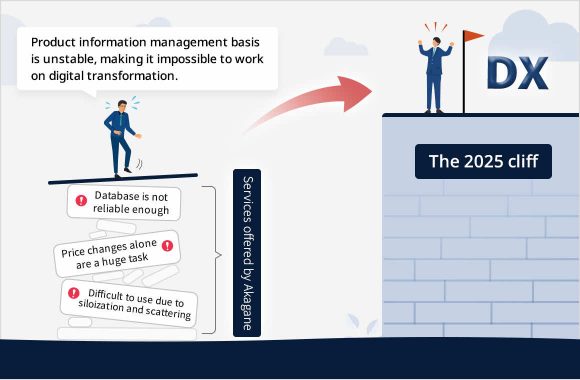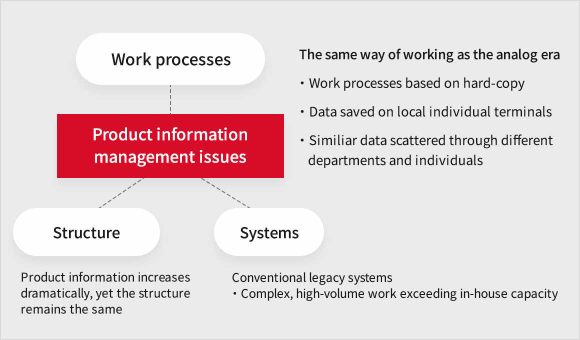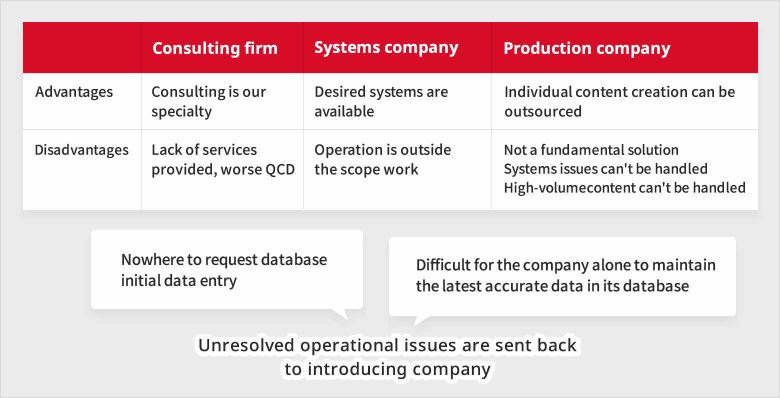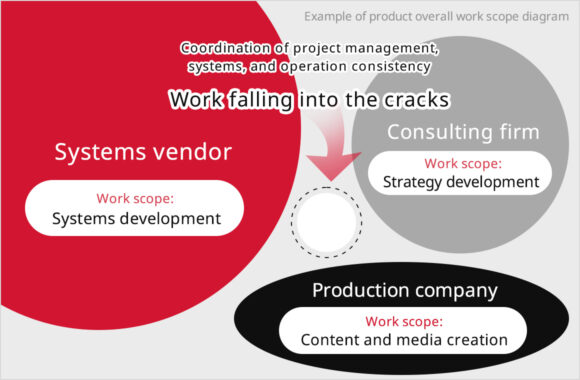


“No one will, can, or want to do it, but it is something that is important to companies and society.” We will do these jobs.
Through these services we provide, we hope to contribute to our clients and the world, which in turn will make Akagane invaluable.
A wide range of products are offered by companies to meet the customers’ needs, yet the customers can not find the products. When an inquiry about a product is received, the information is scattered and unorganized, so collecting product information is done manually and responding to each inquiry or estimate request takes time and can lead to missed sales opportunities and inefficient operations.
Above all, there is a desire of achieving sales on different level and business reforms through digital transformation, but the product information database that is necessary for this is insufficient, or it is siloed and scattered, making it difficult or impossible to use. Therefore, even a simple price change represents a huge task.
We are here for companies like this and we provide services resolving issues with product information management, an essential prerequisite for the business activities, sales activities, and digital transformation. In particular, we focus on B”B product information management.

There is a reason for problems to arise in high-volume product information management.
For example, systems and work processes may be left over from the analog era. In this case, similar data is scattered across different departments and individual terminals, hampering consistency and leading to confusion about which data is officially correct.
Another issue is the tremendous increase in the volume of information to be made available. For companies doing business overseas, multiple languages are also called for. Media formats are increasing, with multiple sales channels frequently handled. When information must be made available in each context, and optimized in accordance with constantly changing technology and situations, the content volume increases exponentially in size and complexity.
It is becoming impossible to solve this problem with conventional mechanisms, organizations, and frameworks. We often see this pattern play out.

Various solutions for problems like these already exist.
and so on.
*CMS (Content Management System) refers to database systems providing unified product information management.
However, not all companies are satisfied with these existing solutions. The main factors therein include the lack of total solutions.


Vendors tend to handle one function and one function only. Management is difficult (in our view).
The difficulty of B2B business makes it all that much harder.
In order to bring about the right solutions, mechanisms and systems must be introduced and operated based on the client’s specific situation and product characteristics. The client company in itself knows what they are doing, so there is no problem, but the problem is on the vendor’s side.
Consumer-oriented products are easy for vendors to grasp, but the same does not apply to specialized products for corporate use. It is also difficult for the Vendors to understand what they are dealing with. The process takes time and it is basically not possible to transfer the work to other operations, it is inefficient. That is why they won’t, can’t, don’t want to do it.
This is why support services for B2B business are on the decline.
On the other hand, it is the companies engaged in B2B business which are actually supporting Japan and the world today. For example, consumer-oriented products are manufactured by many companies around the world. However, far fewer companies are involved in the industrial production which makes this manufacturing possible. This is because their work requires extremely advanced technological capacity and reliability. The production materials supplied by this limited number of companies make their presence felt in factories around the world.
Many of these supplier companies are based in Japan. Their world-class hard work supports global production, bringing in foreign currency to support Japan as well. Therefore, services in support of these companies should be more readily available. However, compared to the services available for consumers, these businesses tend to have access only to a limited range of services, perhaps because they are little-known, manufacture products in small batches (limiting profits), and produce highly complex products (too much trouble). We work to contribute precisely to these companies, and thereby (albeit indirectly) play our part in supporting Japan and the world.
To return to the main point,
many companies want a complete set of functions needed to solve their problems. However, vendors essentially have one function to offer. Combinations of multiple vendors cannot prevent problems from slipping through the cracks. This is where the client companies struggle.
In addition, vendors cannot be expected to understand the individual context and product characteristics of the client company that are necessary to implement the appropriate solutions. It will be up to the client company to fill in the gaps.
These are the reasons why, there is a struggle with the introduction of systems and solutions, or why there are many systems and solutions that have been introduced yet they are unused or unusable. In short, the vendors “won’t do it, can’t do it, don’t want to do it,” while the client corporations struggle with problems slipping through the cracks.


By handling these important areas that others “won’t, can’t, don’t want to” do, we contribute to our clients and to society. Our work is based around our clients’ needs, not our own convenience. The keywords are “total solutions” and “semi-automated thinking.”
Akagane provides total solutions. We do not stick the client with “problems that slip through the cracks,” we handle them ourselves to the best of our ability. From consulting on the introduction of systems such as PIM and CMS through initial data input, operation planning, and actual operation, we fulfill our clients’ needs and requests.
In addition, based on the existing system and work processes, we can provide client work support (agency) through on-site presence, including data cleansing intended to maintain product data reliability as well as production work. Concurrently, we propose new methods of improving and reforming systems and work processes. To this end, we have developed expertise in the skillful management of high volumes of product information. The keyword is “semi-automated thinking.” Rather than leaving it all up to the system, or trying to do it all manually, we combine the two to resolve our client’s issues thoroughly.
For those that seem difficult to systematize or automate, we will provide a system. Including the use of AI, we have developed and put to good use over 100 dedicated systems and tools. We have a whole set of them, which in many cases can be repurposed as needed.
Even then, if any fall through the cracks, we will handle manually. With a BPO center in Japan as well, we also have access to human resources at our overseas affiliates in Shanghai, Bangkok and elsewhere.
As the services we provide are supported by the people who make up the company, our motto is “Keep on learning, keep on going,” as each and every individual works hard to develop further. All staff work toward various qualifications in fields including IT, graphic design, project management, management, languages and translation, and so on, with the average employee holding three certifications or more.
The unique services we provide enable us to support our client companies engaged in B2B business in terms of business activities, sales activities, and digital transformation (DX). Through all of this we would like to contribute to our client companies and the world.